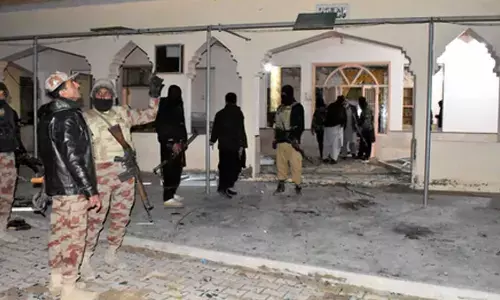Pok and the vacant seats in J&K Assembly

This arrangement is backed by laws passed by an assembly that remains loaded in favour of the Kashmir region.
The Jammu and Kashmir Assembly is probably the only elected House in the world that keeps 24 of its seats vacant in the name of one of its erstwhile regions that is now disputed territory -- what is known as Pakistan-occupied Kashmir or PoK.
That is why voters in the State elect only 87 representatives in a house of 111 legislators.

The distribution of these 87 seats is no less interesting. The Kashmir region, which covers less than five per cent area of the entire State, elects more legislators (46) than what forms the absolute majority in the functional house. Of the remaining two regions, Jammu sends 37 legislators from the 21.63 per cent area it represents and Ladakh elects just four while accounting for 73.97 per cent of the land mass.
This arrangement is backed by laws passed by an assembly that remains loaded in favour of the Kashmir region.
The first assembly, constituted in 1951 by 'Prime Minister' Sheikh Mohammad Abdullah, had 100 members. The Sheikh kept a lion's share of 43 seats for his Kashmir Valley and left just 30 for the Jammu region and two for Ladakh. The remaining 25 seats were left 'vacant' -- for POK until it returns to India.
This composition was formalised in the first J&K Representation of People Act of 1957. The second delimitation of 1995 increased the total number of assembly seats to 111. Kashmir region's share went up to 46 with 37 for Jammu and four for Ladakh. The vacant seats were 24.
In 2002, the National Conference government refused to extend the central government's fourth delimitation to Jammu and Kashmir.
Instead, it used its two-third majority in the house to adopt the 29th amendment to the state constitution to freeze the assembly's composition and the valley's majority until 2031.
But the delimitation of 1995 is remembered more for its clever exercise in social engineering of the constituencies.
Jammu- and Ladakh-based critics (read 'victims') point out that the statistical jugglery ensured that the odds were heavily loaded against the non-Muslim candidates in most constituencies of the Jammu and Ladakh regions.
For example, in the Buddhist-dominated Zanskar constituency, three Muslim majority areas of Langhartse, Bartoo and Barsu were shifted from neighbouring Muslim-majority Kargil Tehsil. That ensured that no Buddhist can ever reach the Assembly from this area. This reflects the deep communal divide among the three regions. Non-Muslim candidates are also affected in Poonch Haveli, Rajouri and Kalakot.
The total strength of the PoK communities presently stands at around a million. But complex state laws and rules have ensured that they cannot return to settle back in the state, mainly on the ground that they were never certified as the 'State Subjects' of Jammu and Kashmir.
Unfortunately, the emergence of militancy and terrorism has changed the demographic character of the state. As a result, the voter distribution today stands at 3,750,000 in the valley, 3,310,000 in Jammu and 160,000 in Ladakh.
Today when the rest of India looks banking upon the Narendra Modi magic in the coming Kashmir elections, the systemic electoral factors in the state are heavily loaded against the forces of change.
If a change really happens despite these facts, then it will simply expose the utter disappointment and loss of faith of the ordinary Kashmiri in its self-appointed gods who have taken them for a ride in the name of Kashmiriyat.










